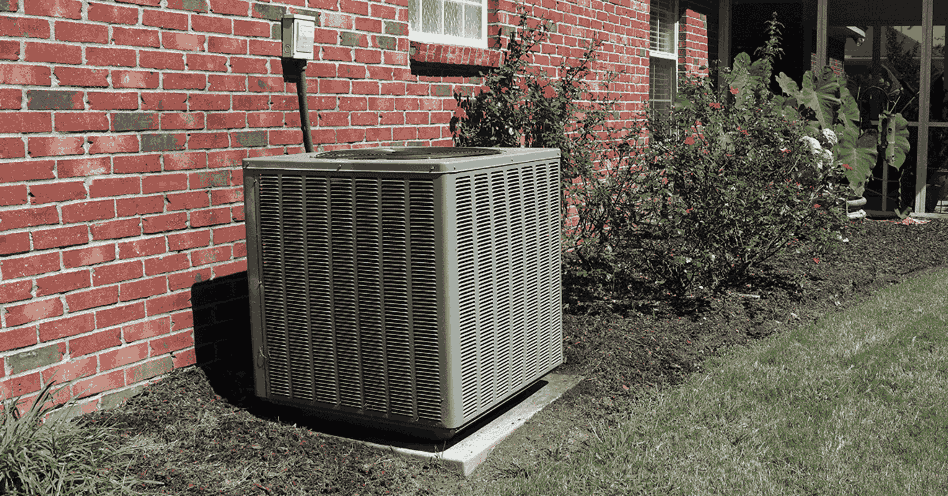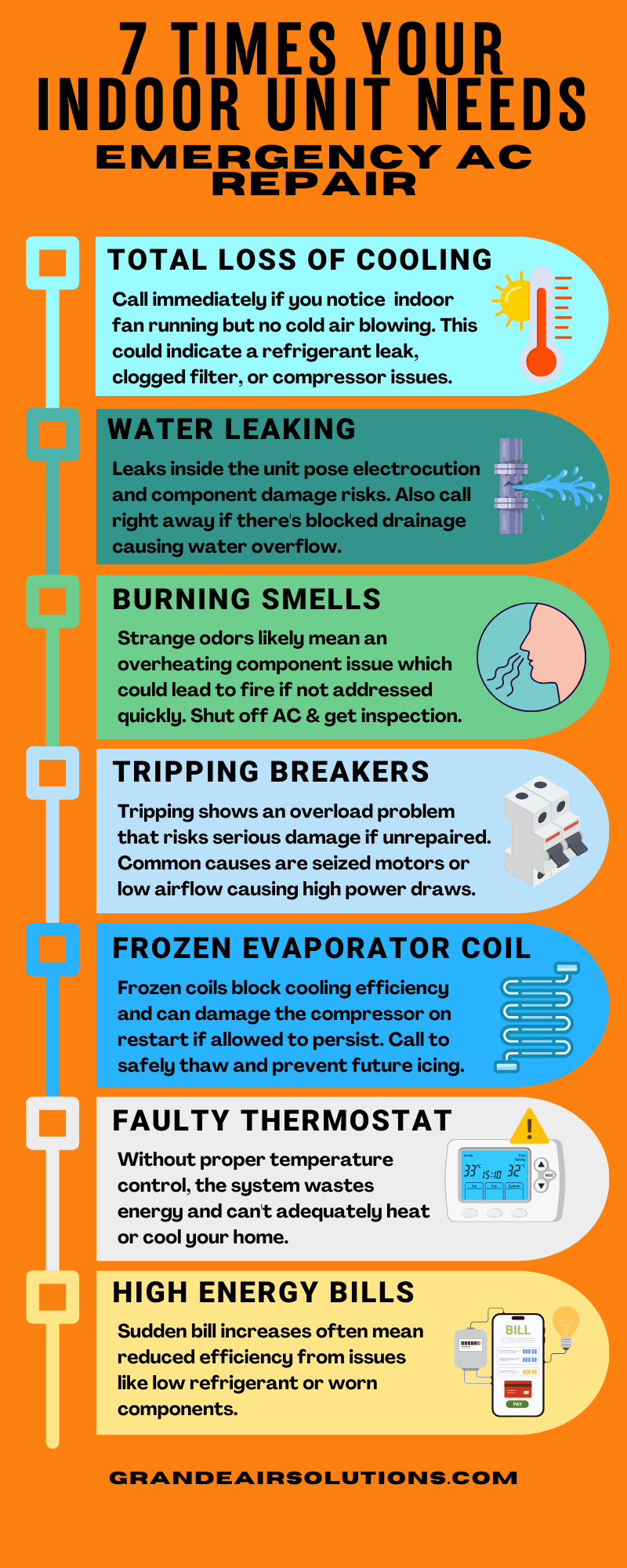
Has your air conditioner suddenly started making strange noises? Are you wondering if you should get emergency AC repair in Austin? Well, you’re not wrong.
When your AC starts making strange sounds, something serious is usually going on. If you don’t get it checked out immediately, you might be left without cooling during scorching Austin summers.
Austin heat is not to be taken lightly; the highs can reach a whopping 97.8 °F, and being stuck with a faulty AC during this time can be a nightmare. So here’s when to grab that phone and call emergency AC repair in Austin right:

You might notice the indoor fan running, but no cold air blows out. This could mean several things:
Low refrigerant levels strain your compressor, risking overheating and failure. With Austin temperatures soaring above 90°F, this is a true emergency.
Symptom | Possible Cause |
Fan running, no cold air | Refrigerant leak, clogged filter |
No air at all | Faulty capacitor, compressor failure |
Don't wait to call for help. Your comfort and safety depend on quick action.
Water where it shouldn't be can cause trouble for your AC. It's not just inconvenient—it's dangerous.
Leaks inside the unit pose serious risks:
A clogged drain line often causes these issues. When it's blocked, water has nowhere to go but out, leading to overflow and flooding.
Frozen coils are another culprit. They block airflow and cause problems:
Problem | Result |
Blocked airflow | Reduced cooling efficiency |
Tripped pressure switches | Compressor shuts off |
Don't ignore water leaks. They'll only get worse. Call for emergency AC repair in Austin right away.
Strange odors from your AC often signal serious trouble. Remember, 86% of A/C fires are due to mechanical malfunction or failure; nearly 50% these fires are from short circuits.
So when you smell burning, it's time to worry. This isn't normal. It means something's overheating inside your unit.
These issues generate heat and odors. If left unchecked, they spell disaster. Continuous operation in this state risks major damage:
Risk | Consequence |
Smoke damage | Costly repairs, health hazards |
Fire | Property destruction, life-threatening situation |
Don't ignore burning smells. Shut down your AC immediately and call for an emergency inspection right away. Quick action prevents worse outcomes.
When your AC keeps tripping the breaker, it's basically crying for help.
Breakers protect your home from electrical overloads. If they're tripping, something's wrong. Common causes include:
These problems overwhelm your electrical system. They push it beyond safe limits. This trips the breaker to prevent damage.
Problem | Effect on System |
Seized motor | Draws excess current, overheats |
Dirty components | Reduces efficiency, increases power draw |
Resetting the breaker isn't enough. You need repairs. Without them, you risk serious damage, and some AC components could melt down.
Ice on your AC isn't cool. It's a sign of trouble.
Evaporator coils shouldn't freeze. When they do, your AC suffers. Two main culprits cause this issue:
Ice buildup blocks heat transfer. Your AC can't cool properly. Worse, it risks damaging the compressor. How? Through liquid slugging.
Problem | Consequence |
Ice buildup | Blocked airflow, reduced cooling |
Liquid slugging | Compressor damage on restart |
Don't let ice linger. Call for emergency service fast. A quick response thaws coils safely, prevents future buildups, and avoids costly compressor damage.
When your thermostat goes haywire, comfort vanishes.
A broken thermostat wreaks havoc on your AC system. It can't regulate temperature properly. This leads to big problems:
Without proper control, your AC wastes energy. It can't cool or heat as needed, leaving you sweating or shivering.
Issue | Impact |
Control board failure | No temperature regulation |
Wiring problems | Erratic AC operation |
Don't ignore thermostat issues. They're more than inconvenient. They waste money and strain your system. Call for repairs quickly.
Skyrocketing bills? Your AC might be crying for help.
Sudden spikes in energy costs often signal AC problems. Common culprits include:
These issues decrease efficiency over time. Your AC works harder, using more power. The result? Your wallet takes a hit.
Problem | Effect on Efficiency |
Low refrigerant | Decreased cooling, increased power use |
Worn components | Reduced performance, higher energy consumption |
Don't wait for bills to skyrocket. Early repair prevents further damage. It saves money in the long run. Avoid financial losses from outdated equipment.
The compressor is the heart of your AC's outdoor unit. It pumps refrigerant through the system, enabling cooling. When it fails, your entire AC stops working.
Compressor failure often happens due to:
When the compressor breaks down, you need emergency repair fast. Waiting for a while can damage other parts and leave your home sweltering. A technician will fix or replace the compressor to keep your AC running.
Refrigerant is crucial for your AC's cooling process. It absorbs the heat and releases it as it moves through the system. Leaks in the outdoor unit can cause refrigerant loss over time.
Common causes of refrigerant leaks include:
Low refrigerant levels make your AC work harder to cool your home. If not addressed quickly, this strain can lead to compressor failure. An emergency repair is needed to find and fix the leak, recharge the system, and prevent further damage.
Signs of Refrigerant Leak | Action Needed |
Weak airflow | Call for emergency repair |
Ice on the outdoor unit | Shut off the AC and seek help |
Hissing sounds | Immediate professional inspection |
The outdoor unit's fan motor is vital for heat dissipation. It pulls air through the condenser coils to release heat. If it fails, your AC can't cool properly and may overheat.
Fan motor problems often stem from:
A broken fan motor can cause your compressor to overheat and fail, causing costly repairs or replacements.
Fan Motor Issue | Potential Consequence |
The motor won't start | Compressor strain |
Slow spinning | Inadequate cooling |
Loud noises | Bearing failure |
Emergency service is crucial to fix the fan motor and prevent further damage to your AC system.
Electrical problems can stop your AC's outdoor unit from working at all.
Your outdoor unit depends on several key electrical parts:
When these parts fail, your AC won't turn on. You might hear clicking or humming noises or nothing at all. This leaves your home without cooling, a big problem in Austin's heat.
Signs of electrical issues include:
You need emergency repair to fix these problems fast. Tech will check each part, replace what's broken, and get your AC running again.
Electrical Component | Common Issues |
Contactor | Stuck, pitted, or burned contacts |
Capacitor | Bulging, leaking, or complete failure |
Wiring | Loose connections, frayed insulation |
Austin's wild weather can wreak havoc on your AC's outdoor unit. Make sure to always keep your outdoor unit safe with elevated structure and under adequate shade protection.
Storms, high winds, and hail can lead to serious damage:
This damage isn't just cosmetic. It can cause big problems for your AC. Bent fins block airflow, making your unit work harder, and broken fan blades can throw things off balance, leading to more damage.
After a storm, check your outdoor unit for:
If you spot any issues, call for emergency repair right away. Fixing the damage quickly can prevent more serious problems.
Type of Damage | Potential Consequences |
Bent coil fins | Reduced heat exchange, system overheating |
Damaged fan blades | Poor airflow, increased wear on the motor |
Cracked housing | Water infiltration, electrical hazards |
A repair tech will assess the damage and fix or replace parts as needed. They'll ensure your AC is safe to run and working at its best.
Delaying repairs often result in different air conditioner problems or even complete system failure. Your AC unit might stop working, leaving you sweltering in the Texas heat. Components can break down beyond repair, forcing costly replacements.
Consider these potential outcomes of postponing emergency AC service:
Don't gamble with your comfort. Prompt action saves money and headaches in the long run.
Yes, emergency AC fixes typically come with a higher price tag.
Technicians charge premium rates for urgent calls. They must drop everything and rush to your aid, often outside regular business hours. This disrupts their schedules and demands immediate attention.
Here's a breakdown of factors influencing emergency repair costs:
Factor | Impact on Cost |
After-hours service | Higher labor rates |
Weekends/holidays | Additional surcharges |
Part availability | Rush fees for expedited delivery |
Sometimes, parts aren't readily available. Technicians must source them quickly, incurring extra fees. This urgency can significantly bump up your final bill.
While pricier, emergency repairs prevent further damage and restore your comfort swiftly. Weigh the cost against the value of immediate relief in Austin's sweltering climate.
Sometimes, AC issues don't need immediate attention. Here are three scenarios where you can get the repairs during regular business hours:
Weak airflow doesn't always spell disaster. You might notice less air from your vents, but you can probably wait if your home stays cool.
Common causes of mild airflow problems include:
These issues can make your AC less efficient but are not emergencies. If your indoor temperature remains comfortable, you can schedule a technician for the next business day. They'll inspect your system and perform routine maintenance to address the problem.
Strange AC noises can be alarming, but not all require urgent attention. Light rattling, buzzing, or clicking sounds might indicate minor issues.
Noise | Possible Cause |
Light rattling | Loose panel |
Buzzing | Minor electrical issue |
Clicking | Debris in the outdoor unit |
These sounds may be annoying, but they rarely cause immediate damage. If your AC still cools effectively and you don't notice other problems like strange odors or cooling loss, you can wait for a regular repair appointment.
Slight temperature changes or slower cooling don't always warrant emergency repairs. Your home might take longer to cool, but you can likely wait if it's still comfortable.
Possible reasons for minor temperature issues include:
While not ideal, these problems usually don't need immediate fixing. However, if temperature swings become severe or your AC struggles to maintain the set temperature, don't delay calling for help.
Remember, while these issues might not require emergency repairs, addressing them promptly is crucial. Regular maintenance can prevent minor problems from escalating into costly breakdowns.
Grande Air Solutions offers 24/7 emergency HVAC services to handle any unexpected issues with your cooling system. Our expert technicians are on call day and night to perform emergency AC repair in Austin before minor problems escalate into major failures.
Don't wait until a heat wave to call us—contact Grande Air Solutions today so our team can ensure your home stays cool and comfortable all summer.
